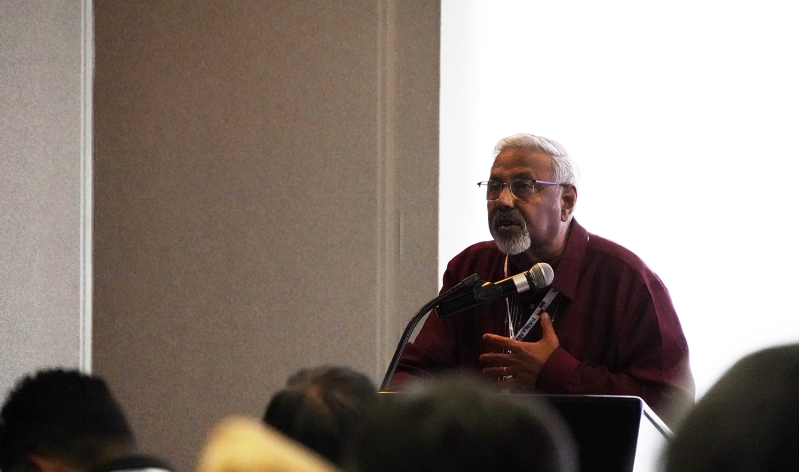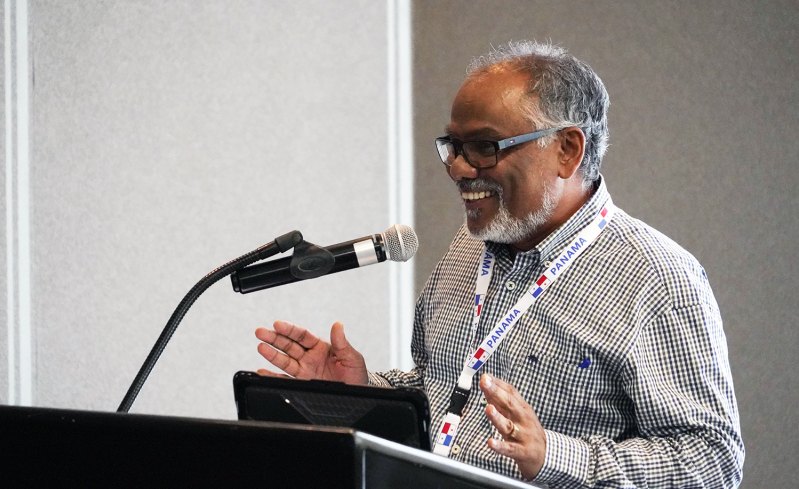The Coala 3.0 meeting followed the third Plenary Session on Monday afternoon (April 28) and focused on “networking with other parts of the churches of the world,” with leaders highlighting the need for deeper collaboration across continents, generations and cultural divisions.
Koala, short for Christ in Asia, Latin America and Africa, is a missionary movement dedicated to promoting South-to-South partnerships and strengthening the church in a majority world. Throughout the day, participants also engaged in table group discussions, reflecting on how lessons can be applied to their ministry contexts from the plenary.
Pastor Jonas Kang: defending a local church-centric mission
Rev. Jonas Kang, general secretary of the Korea World Mission Association (KWMA), launched the session by highlighting the strength of the South Korean missions and the need for mutual respect and partnership with local churches in the southern part of the world.
Kang shared that the KWMA, which consists of over 145 member institutions, connects both local churches and international mission institutions in Korea. South Korea’s mission currently involves more than 21,400 missionaries from around the world, with the number reaching over 30,000 when it includes the broader category.
Looking back on his tenure as general secretary during the Covid-19 pandemic, Kang pointed out how the crisis exposed the vulnerabilities of traditional mission structures. Many Korean missionaries had to evacuate, revealing their reliance on external support structures.
“What we learned during the pandemic is that missionaries, despite their good intentions, are outsiders. When a crisis comes, it is the local followers, it is the local followers who are endured and guided.”
Kang emphasized the need for a mission strategy that prioritizes local leadership. He referred to a series of “missions for mission practices” developed in Bangkok and proposed a transition from a top-down model in which local churches define needs and strategies to a “partnership mission.”
“In a new era of missions, missionaries who send churches and receive churches must work in mutual agreement. Local churches are not the mission field that should be occupied, but the honorable partner,” he said.
Parallel to the age of classical music, Kang compared the need for a synergistic effect of the mission movement of mutual inspiration that took place among composers such as Joseph Haydn, Ludwig van Beethoven, and Wolfgang Amadeus Mozart.
“Just as the creative excellence of that era was born through collaboration, he said, “The global South churches must also be involved in the mission, both simultaneously and together.”
He also emphasized that national mission associations such as the KWMA must work closely with local churches to maintain and expand mission movement.
“As long as the mission movement is healthy and sustainable, active participation and leadership of local churches is essential.”
TV Thomas: Raising the next generation of mission leaders
The second speaker, TV Thomas, was originally a cross-cultural leadership expert from Malaysia, challenged the audience to deliberately prepare the next generation for mission leadership.

Having served on more than 38 national, regional and international Christian organising committees, Thomas reflects the key leadership gaps he observed decades ago.
“In the early 1980s, he said, “It became clear that we were weak in nurturing sufficient leaders for the kingdom and fostering poor people of board governance.”
Thomas warned that many mission organizations have greyling leadership. This trend, he said, puts the future vitality of the global mission at risk.
Emphasizing four key challenges: context, individual, workplace and mission world challenges, he explained that today’s complex, multi-generational context requires new approaches to leadership development.
“Eight generations are alive today,” Thomas said. “Each of which has a different core value and perspective, shaped by unique historical experiences.”
He emphasized the importance of understanding the differences between these generations, learning their strengths and weaknesses, and adapting their leadership style accordingly.
Thomas outlined practical steps to fostering young leaders.
Mind Purpose: Leaders must commit to creating room for young voices at the decision table. Deliberate recruitment: Organizations should actively search for emerging leaders rather than relying on traditional networks. Understanding generational capabilities: Leaders must learn the strengths and values of different generations to promote healthy collaboration. Clear purpose and direction: Organizations must clarify clear missions and visions to stimulate commitment. Building relationships: Leaders should prioritize relationals over transactional connections. Developer Development: Mentorship should focus on recognizing and expanding individual possibilities. Deep Resting Practice: Leaders need to create a safe space for new voices to be heard.
“We need Joshua at Moses’ table, Elisha at Elijah, Paul at Barnabas’ table, Timothy at Paul’s table,” Thomas said. “If we don’t create space, we’ll miss the leadership that God is growing up.”
He urged mission leaders to resist isolation and the temptation of generational silos, reminding them that without generational renewal, the mission would fade.
Dr. Peter Vimarazekaran: embracing migration and interaction
The final speaker, Dr. Peter Vimalazekaran, brought a deep, personal and current perspective rooted in his experiences serving Sri Lankan refugees among German immigrants.

“The transition is reshaping the situation of our global mission,” says Vimalasekaran. “It’s no longer a mission from the west to the rest, it’s everywhere and everywhere.”
Vimalasekaran, who co-founded the German Evangelical Immigration Centre and headed the refugee and immigration ministries, emphasized the importance of recognizing the “face behind the statistics.”
“Refugees and immigration are not just numbers,” he said. “They are children who have images of men, women, and God and have a lot to teach us.”
Sharing stories from his ministry among over 40 nationalities, Vimalasekaran explained how trauma, resilience and faith intersect in the immigrant community. He warned against seeing immigrants as a mission field alone, and instead advocated for a mutual respect-based partnership.
He also noted the rise of the far-right movement in Europe, challenging global churches to provide prophetic and countercultural witnesses of hospitality and inclusion.
“The reality of immigration forces us to move from a single-centered, multicentered mission model,” he said. “The new mission centres are appearing in unexpected places.”
Vimalasekaran urged Coala participants to embrace non-traditional models of the mission based on authentic friendship, perseverance, empowerment of marginalized voices, and forgiveness.
“In the world of missions, we often value people what people can do for us. But God’s mission values people simply because they are him.”
From German refugees to global mission leaders, drawn from his own journey, he urged the audience to leave an old model of dominance and embrace mutuality.
“We must build mission partnerships about being about love rather than power, not efficiency,” he concluded.
